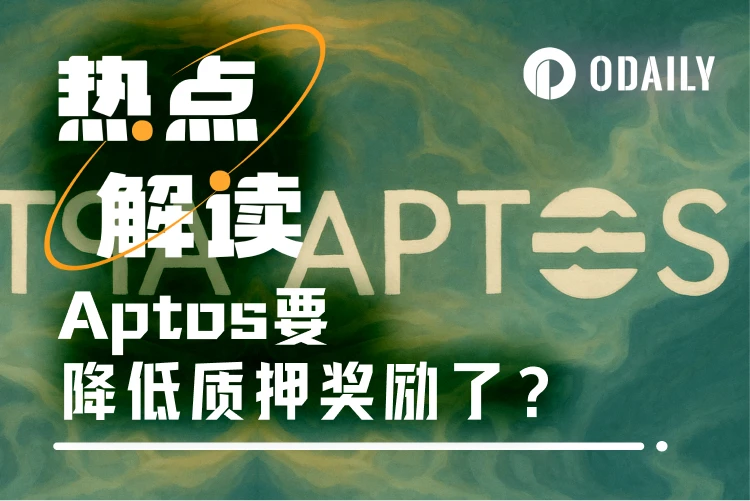原创 | Odaily星球日报(@OdailyChina)
作者 | 叮当(@XiaMiPP)

4月17日,Aptos社区发起了一项新提案(AIP-119),建议在未来三个月内将质押奖励从当前的7%逐步降低至3.79%,每月下调1%。这一提案由Aptos Labs基础设施负责人Sherry Xiao和开发者Moon Shiesty共同提出,旨在通过调整代币经济学,以促进更加可持续和动态的生态系统。
提案核心目标:提升资本效率,激活生态活力
AIP-119 的主要目标是通过对质押奖励进行下调,优化 Aptos 的货币通胀率,鼓励资本从被动质押转向更具活力的链上应用,如 DeFi 协议、再质押、去中心化物理基础设施网络(DePIN)和MEV(最大可提取价值)等。
当前 7% 的质押收益被视为 DeFi 领域的“无风险利率”,过高的激励可能导致用户将资金锁定在质押中,抑制了生态系统的多样性和活跃度。通过将质押奖励降低至 3.79%,Aptos 期望激励用户探索更高收益的链上机会,从而提升生态系统的活跃度,并减轻 APT 代币的通胀压力。
该提案将此次调整视为更广泛代币经济学重构的初始阶段,设有六个月的评估期以评估结果并完善未来策略。
影响分析:机遇与风险
提议下调质押奖励,预计将对 Aptos 生态系统带来多方面的影响。
对于验证者而言,这一变动或将对其盈利模式造成显著冲击,尤其是对于规模较小的运营者。提案中包含了一份基于 5% 佣金率的敏感性分析,结果显示:若 APT 价格保持在 5 至 10 美元区间,当前质押量不足 300 万枚 APT 的验证者,可能将面临亏损。根据数据,目前共有 53 个验证者合计持有约 7840 万枚 APT,占整体已质押供应量的 9%。考虑到预计的年度验证者成本为 3.5 万美元(尽管根据 latitude.sh 等平台提供的硬件规格,部分运营成本有可能压缩至 1.5 万美元左右),小型验证者在成本压力下,存在被市场淘汰的风险。这种潜在的淘汰效应,若未被有效干预,可能进一步导致质押资源集中,进而削弱网络的去中心化特性。为此,提案中也提出了配套措施——计划设立社区验证者支持项目,通过提供补助金和委托质押,扶持中小验证者,维护网络的多样性和韧性。
而对于 APT 持有者而言,质押奖励的下降同样意味着长期持有意愿可能会受到一定影响。毕竟,质押一直以来被视为一种相对低风险、稳定回报的资本配置方式。提案方则认为,这种负面效应将随着通胀压力的减轻,以及生态系统中新兴奖励机会的出现而得到平衡。预计在接下来的六个月内,Aptos 生态或将有一系列新的 DeFi 项目上线,旨在为资金寻求更具吸引力的链上去处。
社区声音
Aptos社区对AIP-119的反应呈现出多元化的声音。
陈剑Jason(@jason_chen998)在其分析中指出,提案是Aptos官方通过社区形式推动的策略,旨在通过降低通胀稳定币价,同时激励大户将资金投入DeFi,激活生态。他认为,结合新任CEO Avery Ching的上任和对亚洲市场的重视,Aptos正试图效仿Sui和Solana的“造富效应”,通过更接地气的打法重振生态。
Roger波杰克(@roger9949)称其为“牛X提案”,指出基金会作为最大质押方主动降低奖励,展现出“欲练此功必先自宫”的决心。他认为此举在倒逼基金会建设生态,将推动币价的正向循环。另在4月24日进一步表示,降低质押收益和支持社区是既得利益者艰难但正确的决定。
Anymose(@anymose96)发帖称AIP-119引发争议,海外大户因质押收益被砍而“急了”。他认为提案对生态长期利好,但短期可能得罪依赖高收益的大户,导致抛压。
PANews(@PANewsCN)分析其目标是抑制通胀、激励资金流转,但指出真正破局点在于“开源”(创造新价值)而非仅“节流”(降低奖励)。他们担忧若无强力生态项目支撑,提案可能适得其反。
值得一提的是,Aptos 基金会已承诺投入 2 亿美元专项资金,用于资助各类生态建设项目,以吸引更广泛的用户与开发者群体。
从更宏观的角度来看,这一提案意图引导资金从单纯的被动质押中释放出来,转向更加积极的链上参与,从而激发 Aptos 生态的新一轮活力。但必须认识到,短期内也存在一定风险:质押收益的降低,可能会促使习惯于高收益的大户资金出现抛压,引发市场波动。因此,这场转型的成败,很大程度上将取决于 Aptos 是否能够在足够短的时间内,推出具有吸引力的 DeFi 产品和链上应用,以顺利吸纳重新释放的资本,并持续维持生态系统的用户粘性与活跃度。
结语
在外部环境持续施压的背景下,Aptos 正处于亟需破局的关键时刻。隔壁同为 Move 系的 Sui 近期在币价走势、生态扩展以及交易所资源倾斜方面频频告捷,形成了一定对比。与此同时,Aptos 的生态建设步伐缓慢,代币表现低迷,社区内部对项目方向和执行力的质疑声逐渐加大。
在这样的困境下,Aptos 也开始展现出自我革新的意图。2025年初,项目方进行了重要的人事调整,华裔创始成员 Avery Ching 被正式任命为新一任 CEO。作为 Aptos 架构的奠基者之一,Avery Ching 此番上位,被广泛解读为 Aptos 意识到管理体系存在结构性问题,并试图通过换帅来重新梳理战略方向与执行节奏。面对生态疲软、用户流失和市场竞争加剧的多重压力,Aptos 能否借此契机完成自我修复,并重新赢回社区信任,将成为接下来一段时间的核心观察点。
免责声明:本文章仅代表作者个人观点,不代表本平台的立场和观点。本文章仅供信息分享,不构成对任何人的任何投资建议。用户与作者之间的任何争议,与本平台无关。如网页中刊载的文章或图片涉及侵权,请提供相关的权利证明和身份证明发送邮件到support@aicoin.com,本平台相关工作人员将会进行核查。



